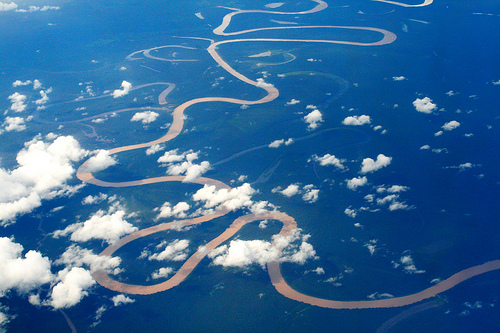Take in the beauty of the Amazon Basin.
- The tropical Amazon Basin includes the Amazon River and surrounding areas, in South America, and it drains large volumes of water into the Atlantic Ocean.
- Approximately two fifths of South America is covered by the Amazon Basin, which equals an area of around 6.9 million square kilometres (2.67 million square miles).
- The Amazon Basin is the largest of its type on earth, and includes the world’s greatest rainforest, the Amazon rainforest, which covers a majority of the basin.
- The Amazon Basin contains numerous rivers and tributaries, numbering into the thousands, and the collective flow of water from these sources, into the ocean, is approximately a sixth of the world’s total.
- The Amazon Basin is said to be the home to over 1500 species of birds, 14,000 mammal species, 2,200 species of fish, 1000 amphibian species, many reptiles, and thousands of insect species.
Part of the Amazon Basin
Image courtesy of Olga Stavrakis/Flickr
- The Amazon Basin area houses millions of people, including significant populations of indigenous Americans, with the majority settled around the rivers.
- Typically, the Amazon Basin has a wet and hot atmosphere; floods are common; and while cold temperatures are not, they do suddenly occur and can be damaging to the flora and fauna.
- Parts of the Amazon Basin have been cleared for agricultural or mining purposes, notably for soybeans, cattle and gold; and the deforestation has caused extinction of many species.
- Portuguese and Spanish are the most spoken languages of the Amazon Basin area, while hundreds of indigenous and nearly lost languages are evident.
- The peak, Yerupajá, in Peru’s Waywash mountain range, is the Amazon Basin’s tallest watershed point, reaching 6,635 metres (21,768 feet) in height.
Bibliography:
Amazon Basin, 2015, Wikipedia, http://en.wikipedia.org/wiki/Amazon_basin
Amazon Basin – Brazil, 2015, World Wildlife Fund, http://www.worldwildlife.org/ecoregions/nt0168
Amazon Basin Facts, n.d, Meet Our Animals, http://nationalzoo.si.edu/animals/amazonia/facts/basinfacts.cfm








